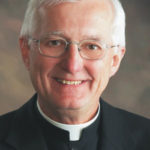By Lindsay Steele
The Catholic Messenger
I just finished the novel “Clock Dance” by my favorite author, Anne Tyler, and can’t stop thinking about the lovable, quirky characters who remind me of people I’ve encountered, some in my own family! Tyler’s novels touch my heart because of the depth with which she explores relationships among her characters.

Building relationships has become an integral part of our church’s call to bring the joy of the Gospel to others, particularly to those on the margins, on the peripheries of society. But when the rubber hits the road, relationship building can involve all kinds of detours, cracks in the pavement and a bumpy ride.
Even the most exasperating characters in Tyler’s novels make my heart ache with love because they mirror some of my relationships. I think of an adult friend with autism, who I used to visit on a monthly basis over dinner but haven’t contacted in quite some time. My excuse: I’ve been too busy. But I wonder whether I’m afraid of how other people perceive the two of us when we are in a restaurant and my friend talks too loudly.
I think about my adult son Colin, who also lives with autism. Last Saturday night I could see my husband Steve holding Colin’s hand during Mass — a sure sign that Colin couldn’t contain his excitement about something. But what was the source of the excitement: a female sled hockey coach’s approaching birthday, the change of seasons, students returning to school or something else?
Probably the sled hockey coach’s birthday, with the other sources being contributing factors, Steve said. Colin is infatuated with the sled hockey coach because she is attractive and has been very kind to him. She remembers his birthday with a card and has attended at least one of his piano concerts.
The sled hockey coach isn’t the first and probably won’t be the last pretty, kind woman that Colin fixates on. Guiding him to build healthy relationships requires a skillset we haven’t quite mastered! Interpersonal communication is one of the greatest challenges for persons with autism and the people who love them. The social cues that typical people take for granted are not part of our son’s DNA.
In “Clock Dance” the protagonist, Willa, develops a maternal bond with a mother and her young daughter whose lives she has entered by fluke. Denise and her 9-year-old daughter Cheryl become the daughter and granddaughter Willa didn’t realize she longed for.
Toward the end of the story, Denise discovers that Willa and Cheryl have kept a secret from Denise, who feels betrayed and hurt. ‘“I should have known you’d come between us; you always putting on this lady act, so cheery and polite and genteel and super …’ … ‘ficial?’ Willa suggested sadly.”
I felt Willa’s pain. The secret hadn’t been something she intended. But the consequence was a damaged relationship with the woman who had become like a daughter to Willa. Relationship building can involve heartache, too.
Colin knows heartache. He becomes deeply attached to the people who enter his life and show him kindness, respect and love. But like the rest of us, he has to learn how to navigate the boundaries of relationships. During his homily at Mass last weekend, our pastor made an observation about relationships. We don’t own people, even those closest to us. They belong to God and we receive them as God’s gift.
(Editor Barb Arland-Fye can be reached at arland-fye@davenportdiocese.org.)











